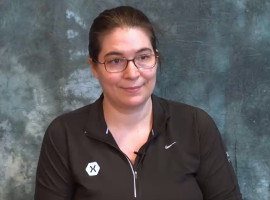InfoQ Homepage F# Content on InfoQ
-
Rachel Reese on The Good and Bad of Microservices (with F#)
Rachel Reese on the challenges and benefits of using microservices at Jet. In particular how F# made it easier to refactor and maintain hundreds of microservices. The hard bit is the infrastructure.

-
Paulmichael Blasucci on Practical Property-Based Testing with FsCheck and F#
Paulmichael Blasucci explains how to use property-based testing in F# with FsCheck and how to ensure the data FsCheck generates fits the problem domain, the reasons for F#, ZeroMQ and more.

-
Mathias Brandewinder on F# for Data Science
Mathias Brandewinder explains why F# is well suited for data science: the REPL, type providers for seamless data access, functional programming concepts and much more.

-
Yan Cui on Graph Databases for Modeling Game Economies, Actors and DSLs with F#
Yan Cui talks about the advantages of using F# to build DSLs and using the actor model. Also: why and how to use graph databases to model (game) economies.

-
Andrea Magnorsky on F#, Property Based Testing With FsCheck
Andrea Magnorsky talks about her experience with adopting F# for .NET game development, where F# fits, property based testing with FsCheck, and much more.

-
Richard Minerich on Functional Programming, F#, Type Providers and Dynamic Languages
Richard Minerich explains the reasons for choosing F#, how F# Type Providers help to integrate languages like R, how to bring Functional Programming to enterprise developers, and much more.

-
Tomas Petricek on F#, Type Providers, Functional and Reactive Programming
Tomas Petricek explains F# and some of its features like Type Providers, pits F# Computation Expressions vs Monads, and highlights issues teaching functional programming to developers, and much more.
-
Phil Trelford on Functional Architectures, F#
Phil Trelford discusses how to design large scale applications with functional concepts, the state of the F# community and much more.

-
Scala, Erlang, F# Creators Discuss Functional Languages
In this interview from the Erlang Factory event in London, three creators of modern functional languages -- Martin Odersky, creator of Scala; Joe Armstrong, a creator of Erlang; and Don Syme, creator of F# -- discuss the similarities and differences of their creations. They also discuss their languages’ common thread -- that they integrate object-oriented features in functional languages.

-
Simon Thompson and John Hughes on Functional Programming with Erlang and Haskell
Functional programming experts Simon Thompson and John Hughes discuss functional programming in today’s computing environments, particularly through the use of the Erlang and Haskell languages. In addition to debating the intricacies of both languages and their similarities and differences, Thompson and Hughes also discuss the growing popularity and maturity if functional programming.

-
John Hughes on Why Functional Programming Matters!
John Hughes is the author of “Why functional programming matters” paper and in this interview he outlines the merits of functional programming and the reason for his involvement with it. He also goes over several core principles of functional programming like monads, handling of side-effects, etc.

-
Jim Coplien: Why DCI is the Right Architecture for Right Now
Jim Coplien, co-creator of Data, Context and Interaction (DCI) architecture, covers a variety of topics including DCI, the importance of language support for DCI and the state of Agile development. Coplien has championed the DCI architecture with Trygve ReensKaug, the inventor of the Model-View-Controller (MVC) architecture, which separates data and its processing from presentation.
